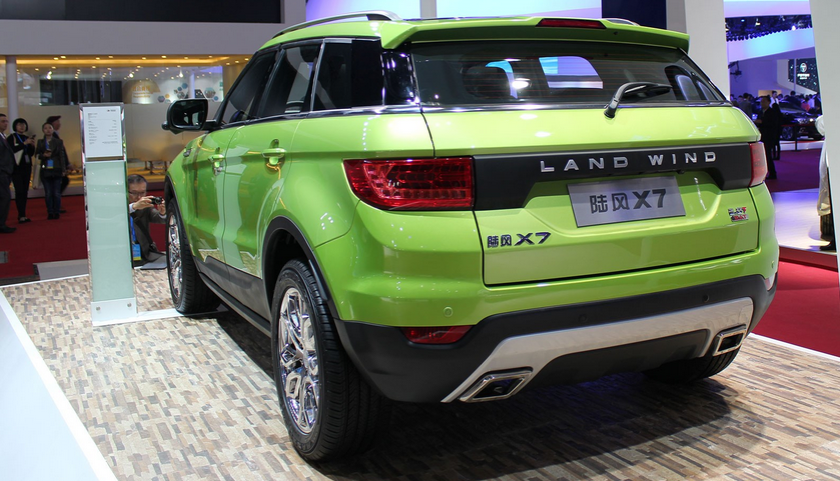By Will Heilpern
The counterfeit-goods industry in China is enormous.
Four of every 10 products sold online in the country are counterfeit or of "bad quality," according to a 2015 report by the Chinese news agency Xinhua.
Fake goods are not limited to online stores, though.
Entire markets are filled with cut-price fake goods and shop fronts that appear to be rip-offs of American brands like KFC and Walmart.
Most recently, a Chinese sportswear brand called Uncle Martian launched, which carries more than a passing resemblance to Under Armour.
We compiled 17 of the most brazen Chinese copycat brands.
Mamta Badkar and Cooper Smith compiled an earlier version of this report.
Four of every 10 products sold online in the country are counterfeit or of "bad quality," according to a 2015 report by the Chinese news agency Xinhua.
Fake goods are not limited to online stores, though.
Entire markets are filled with cut-price fake goods and shop fronts that appear to be rip-offs of American brands like KFC and Walmart.
Most recently, a Chinese sportswear brand called Uncle Martian launched, which carries more than a passing resemblance to Under Armour.
We compiled 17 of the most brazen Chinese copycat brands.
Mamta Badkar and Cooper Smith compiled an earlier version of this report.
1. Under Armour is considering taking legal action against copycat Chinese-sportswear brand Uncle Martian.
A company in China just unveiled a premium sports clothing brand that looks very similar to Under Armour.
Images from Uncle Martian's launch show were shared widely on social media this week when people noticed the blatant similarities between the two sports clothing brands.
The 25-year-old Chinese sports manufacturer Tingfei Long Sporting Goods Co. is behind the new brand, according to Mashable, where we first spotted the story.
Uncle Martian is not even trying to hide the similarities between the two sports clothing brands.
On Weibo, a Chinese social-media site, Uncle Martian shared a post that included a photo of the Under Armour logo alongside images from the launch.
Under Armour sent Business Insider this statement on Saturday: "Under Armour is aware of the Uncle Martian launch event. Uncle Martian’s uses of Under Armour’s famous logo, name, and other intellectual property are a serious concern and blatant infringement. Under Armour will vigorously pursue all business and legal courses of action."
China has copyright laws that are fairly similar to those of Western countries.
It has been a part of the World Trade Organization since 2001, which requires it to establish significant intellectual property law.
The problem is that these copyright laws are difficult to enforce in China, according to the China Business Review.
See if you can tell the difference:
Check out the Uncle Martian model on the catwalk:
2. HiPhone has been copying Apple's iPhone for years. The HiPhone 6 looks very realistic on the outside, though it runs an Android operating system.
3. The Onda Air bares a close resemblance to the iPad Air. It runs Android and Windows.
4. It isn't just fake Apple devices that have been ripped off. There have been entire fake Apple stores, too.
5. The Landwind Suv looks a lot like a Range Rover ...

Call the lawyers! China's worst knock-off designs from the Shanghai motor show http://www.carmagazine.co.uk/features/car-culture/its-a-knock-off-chinas-copycat-cars-at-the-2015-shanghai-motor-show/ …
6... while the Geely GE looks like a Rolls-Royce Phantom.
7. Shijingshan Amusement Park in Beijing blatantly apes Walt Disney's Disneyland. The park's management described its copy of Cinderella as looking like "a Chinese country girl," according to The Associated Press.
8. Walmart has clearly been the inspiration for Wumart. A representative for the Chinese supermarket said candidly, "We dream about being the Walmart of China," according to The Economist.
9. Tired of finding Starbucks in every town you visit? Try out Sunbucks in Shanghai.
10. One of the many Chinese rip-offs of KFC was Beijing's Obama Fried Chicken. But the shop took down the sign in 2011 after facing pressure from local authorities.
11. Pizza Hut is mimicked by Pizza Huh.
12. Unsurprisingly, McDonald's has not escaped the copycat treatment. This Chinese example is actually one of the most subtle.
13. China managed a mash-up rip-off of "Harry Potter" and "The Lord of the Rings" in the same book. It translates as "Harry Potter and the Leopard Walk-Up-To Dragon."
14. There is a striking similarity between Borios and Oreos.
15. Cerono Extra looks incredibly similar to Mexican beer brand Corona's products.
16. Olay shampoo is replicated by Okay.
17. This copy of Wrigley's gum is incredibly difficult to pronounce.

